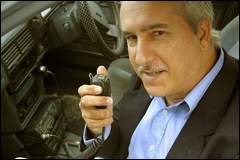
Our man in Bermuda: Glen Cuoco speaks over the car radio that he used to contact the National Hurricane Centre in Miami when Hurricane Gert brushed the island
 Our man in Bermuda: Glen Cuoco speaks over the car radio that he used to contact the National Hurricane Centre in Miami when Hurricane Gert brushed the island |